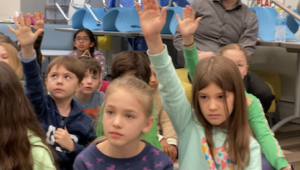Benefits of Memoir Classes: About Teaching online
March 26, 2020 • 12 Comments • Posted in blindness, careers/jobs for people who are blind, memoir writing, teaching memoir, technology for people who are blindOver the 15-plus years I’ve been leading memoir classes in Chicago many many people have suggested I offer an online course as well. “You’d get people from all over the country,” they say. “You could charge a lot, and you wouldn’t even have to leave home.” Not leave home? Being with my writers is what I love most about teaching memoir. Hearing Wanda’s classmates scramble to find her a seat when she arrives; sensing the drama of passing a bag of Scrabble tiles around to determine who picks “Z” out of the bag (usually “A” goes first, but sometimes I go backwards!); Bindy’s delight to hear an assignment that inspires a limerick; Janie reading an essay out loud for a fellow writer whose low vision prevents them from doing so on their own; the collective gasp when Bruce recites a particularly poignant phrase; hearing updates on our new Grail Café from writers who stopped there before coming to the class I lead in the neighborhood; taking in the ooos and ahs whenever Michael brings a show and tell to passs around as he reads his latest essay.
Not leave home? Being with my writers is what I love most about teaching memoir. Hearing Wanda’s classmates scramble to find her a seat when she arrives; sensing the drama of passing a bag of Scrabble tiles around to determine who picks “Z” out of the bag (usually “A” goes first, but sometimes I go backwards!); Bindy’s delight to hear an assignment that inspires a limerick; Janie reading an essay out loud for a fellow writer whose low vision prevents them from doing so on their own; the collective gasp when Bruce recites a particularly poignant phrase; hearing updates on our new Grail Café from writers who stopped there before coming to the class I lead in the neighborhood; taking in the ooos and ahs whenever Michael brings a show and tell to passs around as he reads his latest essay.
“Being right there to sense writers reading their stories in their own voices, watching how trust grows in a group of people who share life stories…to me that’s the most important part of what I do,” I tell the online pushers. “Eavesdropping before and after class tells me a lot, too, and you just can’t eavesdrop like that online.” I thank the friends for the online class idea. “But it just won’t work for me.”
Those online pushers are a determined bunch.
They power on, describe a site or program or app or whatever it is you call it where you can see everyone’s face on the screen. “You can see everyone there and watch their reactions right from home,” they reason.
“But I can’t see!” I remind them. That’s usually where The conversation ends.
Writers join the memoir-writing classes I lead for all sorts of reasons. Some want to hone their writing skills, some hope it will improve their memory, others want to collect their essays as a gift to their relatives. Some like the weekly deadline, some hope to get their essays published, others count on sharing time every week with a group who likes to hear –and share — their life stories. This post written by Dr. Jeremy Nobel in the Harvard Health Blog presents scientific data supporting a benefit many writers don’t anticipate when they first sign up: the idea that writing and sharing stories about your life can be “even lifesaving in a world where loneliness — and the ill health it can lead to — has become an epidemic.” From his blog:
Picking up a pen can be a powerful intervention against loneliness. I am a strong believer in writing as a way for people who are feeling lonely and isolated to define, shape, and exchange their personal stories. Expressive writing, especially when shared, helps foster social connections. It can reduce the burden of loneliness among the many groups who are most at risk, including older adults, caregivers, those with major illnesses, those with disabilities, veterans, young adults, minority communities of all sorts, and immigrants and refugees.
Dr. Nobel did not specify in his blog whether the sharing had to be done in person to fight loneliness, or if sharing online would work just as well.
When it was determined that the Thursday afternoon Village Chicago class would not be meeting in person for their fifth and sixth classes of this session, I decided to try an experiment: send an email with their prompt, assure them I’d still edit essays for anyone who wanted to send their assignments my way, then encourage them to “reply to all” and email their completed essays (whether edited by me or not, that didn’t matter) to their fellow writers to read at their leisure. I would email my comments to every writer who sent an essay, and Comments from their classmates would come to them via email, too rather than in person. I made it clear that students were not required to read the essays they received via email, but I encouraged them to do so and respond to help us keep in touch while classes were cancelled. Results?
- During week one, 20% of the writers sent essays to their fellow writers via email, and 6.66% of writers emailed their classmates with a comment.
- During week two, our final class of this six-week session, 6.666% of the writers sent essays to their fellow writers via email, and 0% emailed that classmate with a comment.
I know, I know. This is just a personal non-evidence-based very short experiment, and maybe it’d work if I used one of those apps, but really, I’m too busy washing my hands and spraying the knobs on the radio to learn how to download one right now. So I’m sticking to my guns. If I’m the one teaching, it’s gotta be in person.
Or so I thought.
I’ve mentioned Wanda Bridgeforth, our 98-year-old memoir matriarch, in this post and want you blog readers to know she is doing well. “I am not really affected,” she told me during one of our phone calls these past few weeks. “I stay home most of the time anyway!”
For the past three years, Wanda has been participating in the University of Chicago Medical Center’s Comprehensive Care, Community, and Culture Program and receives a personal phone call every three months to ask about her health and the quality of care she has been receiving. “But this past week it was different,” she told me over the weekend, marveling at how the doctor who called this time managed to be on the phone with all the study participants at once. “He could answer all our questions about the coronavirus and all that, they had 15 of us all on the phone line at once!”
I had questions. Could everyone on the phone actually hear each other? Wasn’t it scratchy? Was everyone polite? Didn’t people interrupt each other? “Oh, no, it was great! All very clear,” she assured me. “So listen, okay with you if I make some phone calls Monday morning, you know, to se how that works and if we can set something like this up for our class?”
Of course I said yes!



